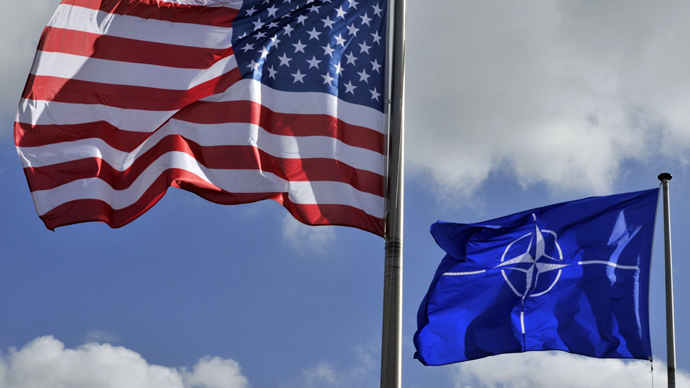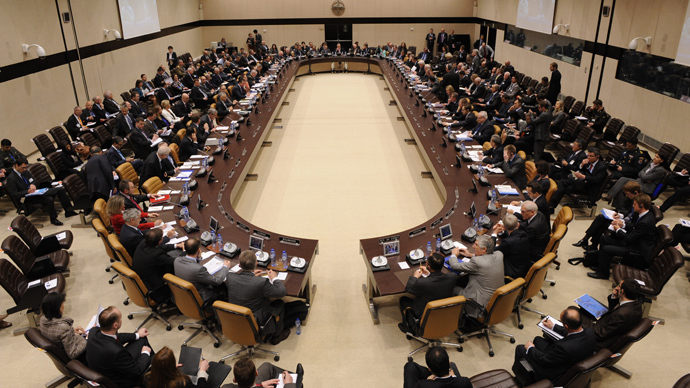'For US, the only purpose of NATO is burden sharing'

The US needed to minimize military spending costs, so NATO’s purpose in Syria, Libya and Iraq was to get EU states to contribute to the US military program, Professor of Economics at the University of Missouri, Michael Hudson, told RT.
RT:Germany has very close economic ties to Russia, but it's coming under huge American pressure to act. But if Berlin brings about sanctions, won't they simple shoot themselves in the foot?
Michael Hudson: Obviously there are two different views within Germany, because of the close links they don’t want to do anything that is going to disturb the relationship with Russia. But there has been a large confusion over what just NATO is about and about what the German contribution to NATO is about. NATO for the last 30 years has not been about defending Europe. Obviously nobody thinks there is going to be any invasion of Europe from anyone – not from Cuba, Russia or Brazil. The purpose of NATO from the American point of view was burden sharing. Since the 1960s and 1970s military spending has been the single major cause of the US balance and payment deficits. So within Congress and within the Pentagon there was a discussion on how we are going to minimize the balance and payment costs of our military spending in Asia, Europe and the Near East. The answer was burden sharing. And the purpose of involving NATO in Syria, Libya and Iraq, which have nothing to do with North Atlantic at all, is basically to get Germany and France and other European countries to contribute to the American military program.
This is a tension felt in Germany, France and other countries now, but especially on the German Die Linke party and some of the social democrats who say “Why should we, Europeans, be taxed to pay for the American military program and strategy when we don’t have really any voice in forming it?” They are saying “no taxation without representation” virtually, they are saying “Why should we, Europeans, be taxed for NATO’s tax gathering program.” They fund the American military not only in the Near East but now also adventures in Ukraine that is very much against the European tradition. The European arguments in the press are “We want to support the elected governments” but the Obama Administration says “Well, we’ll redefine democracy. Democracy is not an elected government, it is not an elected government in Libya, in Iraq and Ukraine. Democracy is a country that appoints leaders who the American government will approve off and who will agree to impose neo-liberal policies.”
RT:White House press secretary Jay Carney admitted that the sanctions will impact the global economy as well as hurt Russia. Only a few years after the global economic crisis, how wise is it to upset the economy again? Won’t it be very harmful for states like Germany that has strong economic ties with Russia?
MH: The Germans are very clear they are not going to pursue sanctions that hurt German industry. That would be the straw that breaks the camel’s back. And there is some discussion in Germany whether they do really want to remain part of NATO. If they don’t really have a voice in it, do they really need to sacrifice German industry so that American industry moves in and takes over the markets that German industry has. This is an American market grabbing opportunity from Germany, and you can be sure that within Merkel’s only Christian-Democratic party there is a big argument over whether Germany should make a sacrifice of its industry for American industry just because America says so.

RT:Will John Kerry's seeming attempt to shift some of the blame for what's happening in Ukraine onto the EU impact the talks?
MH: I don’t think the Europeans pay more attention to John Kerry than the Americans do. He is basically making these speeches for the American electorate, not to the Europeans to pay attention. Kerry is a new sort of Tony Blair.
He [Kerry] is trying to frame the situation but again, not many people are paying attention. Most people say “What is actually the stake? War is basically financial today?” And you could say “Wars are financed by other means” or “Finances war by other means” and then they realize that all this juggling over Ukraine is basically financial, not only between the West and Russia but between America and Europe. And all this can do is spur a pullback on the part of Europe, saying “Wait a minute, we are pushing for our own interests, not for American national interests.” Again, what it is doing is dividing NATO and making Europeans ask “Is there any real reason for NATO anymore?”
RT:What are the possible consequences of the sanctions against Russia, what do you think?
MH: One consequence will be within Russia itself. It will realize the need that it must be much more self-sufficient and it will have to reduce its dependency on the West and develop much more industrialization. Russia under the World Trade Organization rules is able to sue the US in the International court. And I believe as I have already said that it can soon recover from any damages. And it would be able to recover from these damages by moving against American investments in Russia. So the ramifications could be on America itself. It cannot be good for the foreign investors in Russia, and what Russia can also do is decide to pursue a tax policy that will tax resource rent, mineral rent, land rent and most of the rent that is now being used to generate income, to pay dividends to foreign stockholders. Russia has a very wide range of policies that it can do to resist the sanctions, to be more self-sufficient and basically the effects will not be positive for the US, they will be the exact opposite of what the US is trying to bring about, which is more Russian dependency on the West.
RT:Edward Snowden revealed the US had been spying on Europe, including Merkel herself, for years. In fact, the Chancellor even had her request to see her file rejected. Is she really prepared to sweep this under the carpet, and for what?
MH: Absolutely not. Merkel is from East Germany and they grew up under the Stasi listening to them all the time. And anyone who grew up in East Germany was so traumatized by the tapping of the phones, by the constant surveillance, that this is not something they can get out of the system. All this was sudden, like her eyes were open, saying “The Americans are acting like the new Stasi.” This is everything that she has spent her life fighting against and that was a shock to the system that has led her to doubt in everything the US is doing. She doesn’t want to come out and contradict the President of the United States on her visit here but it makes her very worried about any kind of demands that the US will make on her. And it is beholden on her to back and support German industry and German tax payers against the demands that Obama is making that Germany fund NATO for much more and helping the American producers to outcompete German producers and take the markets away from Germany.
The statements, views and opinions expressed in this column are solely those of the author and do not necessarily represent those of RT.
The statements, views and opinions expressed in this column are solely those of the author and do not necessarily represent those of RT.












